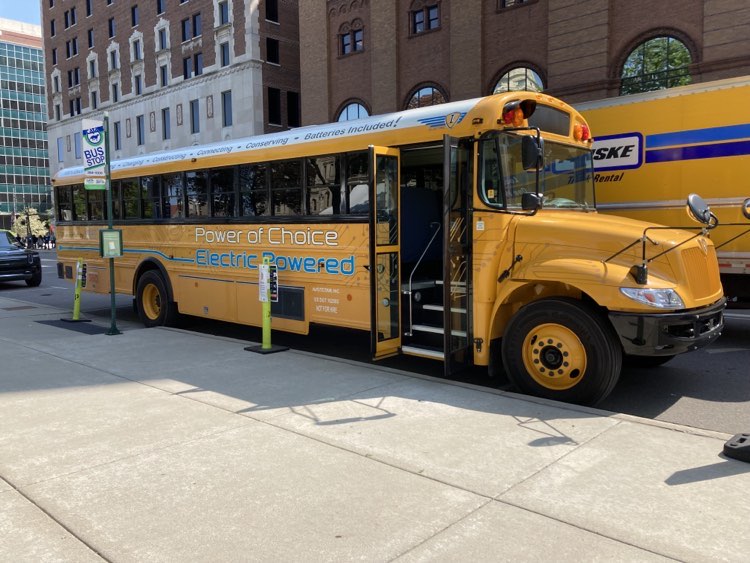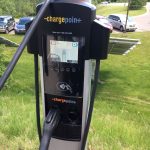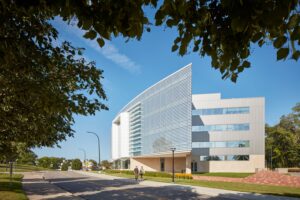
- Kim Kisner
- Community
- 02/20/2024
Working to Create Efficiencies to Free Resources for Communities

The Materials Management Division (MMD) of the Michigan Department of Environment, Great Lakes, and Energy (EGLE) oversees solid and hazardous waste programs, radioactive materials activities, a radon awareness program, recycling, and energy programs.
We interviewed the director of the division, Elizabeth Browne, to get some insights.

Q: How do you think energy efficiency, recycling, and pollution prevention are interconnected when it comes to fostering sustainability in Southeast Michigan?
A: I have always felt you can’t have any without the others, and they are all key to having a sustainable system. Maybe it’s my biologist background. Recycling facilitates energy efficiency since it translates to diverting items from landfills. If you have a good system, you are reusing and recycling materials nearby, you save energy by not transporting material across state lines.
When we look at energy efficiency, it works the same way. If we decrease the effort and resources put into heating, cooling, water usage, and transportation systems by becoming more efficient, we have more resources to allocate elsewhere. And isn’t that the very heart and definition of sustainability?
Q: How do environmental justice and underrepresented communities factor into these efforts in Southeast Michigan?
A: They factor in highly. There are federal funding requirements to help regulate this. The federal Justice 40 program deems that 40% of grant funds be used in underrepresented communities. Even before that, this was a focus for us. If you look at any of our requests for proposals, we pay special attention to projects coming from underrepresented communities – places where the community’s ability to be more sustainable has been stressed. We are always trying to level the playing field.
Q: You work with state and federal partners, entrepreneurs, companies, organizations, and communities to reduce Michigan’s reliance on nonrenewable energy. Can you tell us more about this work?
A: We work with federal partners in seeking every grant opportunity that we feel we have a nexus with.
We work with companies and organizations through the Retired Engineers, Scientists, Technicians, Administrators, Researchers, and Teachers (RESTART) program. This is a group of retired professionals who work with entities to identify where they have energy issues or where renewable energy options may be a benefit.
We do energy audits for houses of worship, schools, and municipal buildings. In many cases, these buildings are older and not efficient, so we offer ideas on how to improve efficiency and look at renewable options. This helps them save financial resources that they can then allocate elsewhere.
We have received grant money through the Charge Up Michigan Program to install fast chargers in communities. Within this program, the cost of charger installation is divided amongst the location owner, the utility provider, and EGLE. This allows us to install more chargers, and it helps the utilities get closer to their energy efficiency goals and benefits the property owner or business.

We have worked with communities to replace diesel- and gas-powered vehicles with electric ones, including Willow Run Airport and the City of Detroit. In Detroit, we replaced diesel-powered garbage trucks with EVs.
We work heavily with NextCycle and the Centropolis Accelerator program at Lawrence Technological University. These are both programs to support businesses in their early stages. NextCycle is geared toward recycling activities, and the Centropolis Accelerator focuses on clean technology and the circular economy.
Q: What are your biggest challenges in materials management?
A: The thing that keeps me up at night is navigating grant programs. There is this huge influx of federal money, but there are a lot of checks and balances, and trying to manage the funding appropriately is a challenge. There is a lot of hurry-up-and-wait involved.
We have a phenomenal team, and I don’t want to break their backs as they work to move the money out to recipients.
Q: What are your highest priorities?
A: Moving as much of the funding to those who need it and doing it in a way that is equitable and fair and hits the highest needs. Sometimes we make decisions that aren’t flashy, but the impact they have on that community is significant. A small community getting a few solar panels to help power their community building so the kids have someplace to go after school is a good example.
We try to disburse the money in a way that supports as many communities and people as possible.
Q: What does the future look like?
A: I think it keeps getting brighter. The Michigan Legislature recently passed an eight-bill package that updates solid waste laws and will ensure we have sufficient landfill capacity.
We just held our Virtual Michigan Materials Management Conference and had almost 600 people from 11 states represented.
Getting EV chargers out across the state and seeing more and more interest in communities in terms of electrification is good progress.
There is so much potential for economic growth in the energy and recycling fields. It’s astronomical. This excites me. Every day, I see people and companies that are looking for support and direction on becoming more sustainable.
More and more companies understand the need to be sustainable because the public is demanding it, and it’s also for their own good.
I encourage everyone to reach out to us. People interested in any EGLE grant programs can go to Michigan.gov\EGLE and search for “grants and financing.” For more information about all things Materials Management Division, our web pages can be found at Michigan.gov/EGLE/about/organization/materials-management.
Be sure to subscribe to our newsletter for regular updates on sustainable business practices in and around Detroit.
Kim Kisner
- All
- Business
- Community
- Education
- Events

ZF Group, a global technology company with its North American headquarters in Northville, specializes in systems for passenger cars, commercial vehicles, and industrial technology. With a focus on next-generation mobility, the company develops solutions that address electrification, automation, and digitalization while aiming to improve safety, efficiency, and sustainability in transportation. SBN Detroit interviewed Anuj Shah, Sustainability Lead, for the Americas, to explore the most pressing environmental challenges in...

The Chip Bag Project, based in Detroit, is a sustainability initiative that upcycles hard-to-recycle snack packaging — particularly chip bags — into insulated sleeping bags for individuals experiencing homelessness. Founded by Eradajere Oleita, the project addresses both environmental waste and housing insecurity by transforming materials like Mylar into practical, thermally efficient solutions. In June, Oleita was among Trelllis’s 30 Under 30, its annual recognition of the brightest young...

PowerPanel, headquartered in Oxford, focuses on sustainable energy technology with a particular emphasis on hot water systems and thermal energy capture. The company designs and manufactures modular solar hybrid systems that integrate both photovoltaic and thermal components into a single unit. Its goal is to offer energy solutions that are more efficient, durable, and economically viable for a range of commercial and industrial applications. SBN Detroit interviewed Garth...







